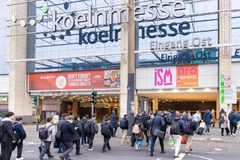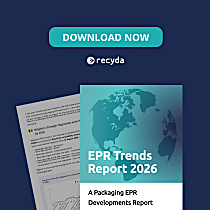Thomas Lindquist: The inventor of EPR reflects on 33 years of failure and future prospects for recovery

02 Feb 2023 --- As extended producer responsibility (EPR) increasingly becomes a part of global climate action, PackagingInsights delves into the concept of EPR with the formulator himself, Thomas Lindquist, to discuss the concept’s evolution and future.
Lindquist is currently a senior lecturer at The International Institute for Industrial Environmental Economics at Lund University in Sweden and introduced the concept of EPR in the 1990s.
He shares that he is optimistic for the future of EPR schemes even though the industry is distracted by other policies such as eco-modulation, which in his opinion is “silly.” Additionally, he highlights how unprecedented economic stressors such as the COVID-19 pandemic and Ukraine war have facilitated policy action.

Lindquist founded the idea of EPR on the principle that a producer’s responsibility for the environmental impacts of its products and packaging extended past the point of sale and consumption. It shifts the responsibility of post-consumer waste management from municipalities and governments to producers, and is aimed at preventing waste at the source, promoting environmentally sustainable product design.
Regarding the future of EPR, he says: “I paid attention and listened to people from other countries and to what was happening in Brussels [EU headquarters]. That made me optimistic.”
“We will still do a lot of silly things, like pay too much attention to eco-modulation. But the problem with modulation is that it doesn't change the companies it changes for the PROs [producer responsibility organisations].It’s working in France and some other countries. It could open up minds for more action and different types of action. Some of the mistakes can be useful.”
How did the idea of EPR come to you?
Lindquist: I was the person who wrote the idea down and put a name on it. But the idea was present in some ways in a few Western European societies, including Germany, the Netherlands, Scandinavia, Austria and Switzerland. Someone said municipalities shouldn’t pay for waste management, it should be paid by the producers, and you should pay when you buy the product.
Municipalities got worried about using more resources for waste management in the countries closer to where I live. We needed help getting the waste out of the municipalities, and treatment became more expensive. Landfills were less and less accepted by society and researchers and required a lot more money.
In its current form, does EPR achieve what you set out to achieve?
Lindquist: No.
EPR meets this need of collecting waste and putting it into recycling. But if we look at that and say, okay, what is recycling? We see today that a lot of the waste is downgraded – it’s landfilled into products. It doesn’t help and it doesn’t replace the raw materials. That is one of the things which I want to come back to and rectify.
What you do with the material and how you get the producers to improve is what I’m missing. Lindquist says today waste is downgraded – it’s landfilled into products.
Lindquist says today waste is downgraded – it’s landfilled into products.
Where do you see the responsibility of retailers and consumers?
Lindquist: It cannot be done without consumers. The question is, how much can you rely on consumers? We need to do a lot better with awareness and understanding.
Regarding retailers, it’s a tricky issue because they have a limited role today and the chances for them to select products, packaging and so on, are rather limited.
Retailers in Sweden are surprisingly active in this aspect. We have seen, for instance, the deposit refund systems covering more products and beverages today. This was after a lot of initiative from the retailers’ side, especially one of the big retailers.
There are packaging initiatives in general to reduce packaging but overall, retailers don’t have such a significant role.
How can EPR be suitable for countries globally?
Lindquist: I think that we need the EU to do something because so many decisions are made by it for the member countries. We need legislation in a number of areas and we won't get into it on a national level.
The logic of EPR is different. It’s very much of interest in Asia today. But some of the fundamentals, like the role of municipalities, are different.
You don’t have Asian municipalities who are getting the budgets in the same way. They are allocated money from the central, and they don’t have huge roles as they often do in Western Europe. That means, how they look upon EPR is different.
On the other hand, the more significant part of the budget is to manage waste. The total budget is not big. So they can’t allocate that much more from it anyway. But certain things could help us, certainly in Europe, but also in some other places.
COVID-19 has been helping and the war in Ukraine has been helping, and that’s the question about having access to materials.
The discussion we have seen in Europe during the last decade or more is about getting some more production, and it’s not like a few decades ago because today, we can imagine it. Companies don’t pay an equally big share for salaries; we are paying luckily more to people in Europe. It’s not such a big obstacle when it comes to this, we have more robots etc.
It doesn’t matter so much if it’s in China or Germany, if you have better access to raw materials and better control it would improve innovation. According to Lindquist, the concept of EPR is very much of interest in Asia today.
According to Lindquist, the concept of EPR is very much of interest in Asia today.
If we suddenly say that we should recycle all the metals from electronics and similar products and not just the plastic casing and steel and copper appropriate, but we went in and said some are rare earth metals, let’s see to it that we recycle them also. It’s just a question about money today. The technology is there and we do it so much better in Europe than they are doing in practice anywhere else.
What’s the way forward for the EU?
Lindquist: We need to get Brussels to accept this. They have problems with so many countries. The 27 countries are so different when it comes to the EPR area. Brussels has tried to concentrate on the ones who could be doing better. But we can get good legislation.
We need researchers who are helping come up with feasible ways of measuring what is good recycling. So that you can put these and other things close to this, but we need to have a simple enough way to determine how successful you are. So it’s a lot to be done, but this is the way we should go.
I think it's definitely a very big thing and we could already do so much better if we really decided to. But we also need some new tools, maybe in the form of standards, etc. So we had the same way of measuring. We need people who find this exciting and interesting to develop and push through the systems.
So it's not a task for one actor, it's a task for really many actors to firstly find it interesting to work with and secondly to kind of get it done.
I’m somewhat optimistic because I did some work on this based on Swedish knowledge and ideas, and I was surprised how well my thoughts go with various stakeholders. People I knew a bit, people I knew better, and people I have never met, we almost 100% agreed on both what has happened and what you need to do.
By Radhika Sikaria











